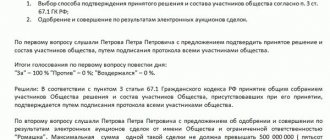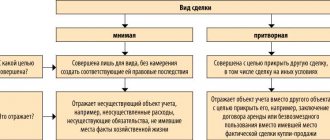https://youtu.be/HPnwkuPYzlg
Conditions for declaring the invalidity of the contract
In what cases is a contract considered invalid?
Consequences of declaring a transaction invalid
You can find more complete information on the topic in ConsultantPlus. Full and free access to the system for 2 days.
The invalidity of transactions under the Civil Code of the Russian Federation is...
Invalid transactions in accordance with the provisions of the Civil Code of the Russian Federation (hereinafter referred to as the Civil Code of the Russian Federation) do not meet the requirements of the law and, as a result, do not give rise to any legal results other than those that are related to their invalidity, for example, restitution, compensation for losses, etc. (p 1, Article 167 of the Civil Code of the Russian Federation).
They are differentiated into 2 categories:
- void, i.e. invalid regardless of their qualification as such in court;
- disputable, the illegality of which is subject to proof in court.
The claim for the invalidity of the transaction and the requirement to apply the corresponding consequences of this, submitted by the party behaving in bad faith, will not be satisfied in full or in part (clause 70 of the resolution of the plenum of the Supreme Court of the Russian Federation of June 23, 2015 No. 25, hereinafter referred to as PPVS No. 25).
For example, when the circumstances referred to by the party requiring to qualify the transaction as invalid were known to her even at the conclusion of the contract (resolution of the 17th AAC dated 09/07/2016 in case No. A60-1906/2016), etc.
Differences between voidable and void transactions
Voidable transactions are recognized as such only by the court. As a result, the court decides to challenge the transfer of the property, considering the corresponding consequences for both parties.
Void agreements can be canceled by the court as voidable (see Termination of a sales contract after registration). For the most part, they do not require going to court, since the legal consequences provided for in the execution of agreements do not occur in this case.
They are incompetent in themselves, which does not require going to court to terminate them.
For example, during the purchase and sale of an apartment, the buyer did not transfer money as payment. This procedure is recognized as obviously not having taken place, void due to violation of the requirements.
If the buyer transferred funds, but instead of the object assumed by the contract received an object that did not meet the quality, it will be necessary to file a claim and challenge the procedure, since it took place, but does not meet the criteria of the concluded contract (see Acceptance and transfer of an apartment).
Sometimes third parties enter into an agreement to sell property owned by the owner. Such an agreement does not become valid and the buyer’s claims are void.
But if the parties disposed of the property, and its owner was faced with the fact of an unfair act, it requires recourse to arbitration.
The difference between an invalid transaction and a void one in civil law
The difference between a void and invalid transaction is that the second concept is much broader than the first: every void transaction is invalid (Article 167 of the Civil Code of the Russian Federation), while not every invalid transaction is void, that is, initially illegal.
The importance of distinguishing between voidable and void transactions is primarily related to the possibility of applying certain legal consequences, the need for the interested party to provide certain evidence allowing one to conclude that such a transaction is invalid (see the resolution of the Moscow District Court of Justice dated September 16, 2015 in case No. A40- 186017/2014).
In addition, the statute of limitations for presenting the above-mentioned claims and assigning appropriate final measures for a void and voidable transaction of the Civil Code of the Russian Federation is established differently (Article 181): 3 and 1 year, respectively.
Read more about the limitation periods for invalid (void) transactions in the ready-made solution of ConsultantPlus. If you do not yet have access to the ConsultantPlus system, you can obtain it free of charge for 2 days.
Consequences of invalidity of void and voidable transactions
Full description
Often, when studying the legal nature of void and voidable transactions, the question arises whether there are differences between them in the consequences of invalidity. A voidable transaction is invalid and is as void as any void transaction.
In the legal literature, invalidity is understood as the absence of legal consequences of a transaction, from which the logical conclusion follows that there are no significant differences between void and voidable transactions.
The Civil Code of the Russian Federation in Article 167 provides for the main consequence of invalid transactions to be the negation of the legal consequences of the transaction from the moment of its completion and bilateral restitution if the execution of the transaction has already been carried out.
The invalidity of a void transaction from the moment of its completion means that initially the transaction did not give rise to any legal consequences for the parties: neither obligatory nor in rem. After its completion, the parties have no rights or obligations arising from the transaction. Deprivation of legal force from the moment of completion of a contested transaction means that, by virtue of a court decision, the legal relationship from this transaction is considered non-existent from the very beginning.
When the invalidity of a transaction is established before execution begins, the parties are deprived only of their rights of obligation, thus they do not have the right to demand that the other party fulfill the corresponding obligation.
Another option is when the parties fully or partially fulfilled an invalid transaction: they exercised rights of obligations, which entailed the transfer of objects of civil law and should have resulted in the parties to the transaction having corresponding rights to these objects.
In this case, the parties will have any objects of civil law without proper legal basis (title). The legal basis (title) will be with the person who had it before the execution of the invalid transaction and intended to transfer it on the basis of this transaction along with the transfer of the object of civil law.
To solve this, it is necessary to transfer an individually defined thing from an illegal owner to a non-possessing owner, as well as transfer things defined by generic characteristics from the person who acquired them unjustifiably to the person at whose expense the acquisition took place. That is, it is necessary that each of the participants in the executed invalid transaction has both a certain object of civil law and a legal basis for its possession (“possession” in the broad sense of the word).
It is precisely to resolve this situation that the norm established in paragraph 2 of Article 167 of the Civil Code of the Russian Federation, which is called “bilateral restitution,” or return to the original position, is aimed.
So, for example, by Decision dated July 20, 2011 in case No. A37-1390/2010, the Arbitration Court of the Magadan Region invalidated the debtor’s transaction - the purchase and sale agreement dated May 11, 2010, for the building of the MC industrial base, concluded between ATV-Capital LLC (seller) and Goncharov Sergei Ivanovich (buyer), and applied the consequences of invalidity of the transaction established by paragraph 1 of Article 61.6 of the Federal Law of October 26, 2002 N 127-FZ “On Insolvency (Bankruptcy)” (hereinafter referred to as the Bankruptcy Law) in the form of returning the disputed property to the bankruptcy estate.
In accordance with paragraph 1 of Article 61.6 of the Bankruptcy Law, everything that was transferred by the debtor or another person at the expense of the debtor or to fulfill obligations to the debtor, and also seized from the debtor under a transaction declared invalid in accordance with Chapter III of this Federal Law, is subject to return to the bankruptcy estate. If it is impossible to return property to the bankruptcy estate in kind, the acquirer must compensate the actual value of this property at the time of its acquisition, as well as losses caused by subsequent changes in the value of the property, in accordance with the provisions of the Civil Code of the Russian Federation on obligations arising from unjust enrichment.
Considering that the property alienated as a result of a transaction declared invalid exists in kind, it is subject to return to the bankruptcy estate of the debtor by canceling the entry in the Unified State Register of Rights to Real Estate and Transactions with It on the registered right of S.I. Goncharov. for the building of the MC industrial base and restoration of the record of the right to the specified real estate for ATV-Capital LLC.
The fact that the disputed object was sold by citizen S.I. under the purchase and sale agreement dated December 16, 2010 to citizen E.E. for 20 million rubles, cannot serve as a basis for refusal to apply the consequences of invalidity of the transaction in the form of return of property, since the purchase and sale agreement dated December 16, 2010 was not registered in the prescribed manner.
Problems often arise in the application of double restitution.
Thus, by the Decree of the Moscow Arbitration Court dated March 12, 2012 in case No. A40-77398/10-103-289B, the pledge agreement dated October 6, 2009, concluded between the Design and Construction Limited Liability Company and citizen E.V. recognized as an invalid transaction with the consequences of the invalidity of the transaction applied to it, excluding the entry on the registration of this agreement from the Unified State Register of Rights to Real Estate and Transactions with It. The resolution of the Federal Arbitration Court of the Moscow District dated July 26, 2012 in case No. A40-77398/10-103-289B established that the application by the courts of the consequences of the invalidity of a pledge agreement by excluding the record of registration of this agreement from the Unified State Register is erroneous, since it is not bilateral restitution by virtue of Art. 167 Civil Code of the Russian Federation, art. 61.6 of the Bankruptcy Law.
The courts did not take into account that the registration of the real estate pledge agreement is carried out by Rosreestr in the manner prescribed by the Federal Law “On State Registration of Rights to Real Estate and Transactions with It,” and the state registrar is not a party to the disputed transaction.
When resolving the dispute, the courts incorrectly applied the above rules of substantive law.
But there are special rules, the analysis of which in a sense suggests the presence of various specific consequences of void and voidable transactions.
For example, in accordance with paragraph 3 of Article 167 of the Civil Code of the Russian Federation, only a voidable transaction can be terminated only for the future, if it follows from its content that it can be terminated only for the future; according to Article 179 of the Civil Code of the Russian Federation, unilateral restitution is possible in voidable transactions; Article 169 of the Civil Code of the Russian Federation provides that in void transactions, restitution may not be applied if both parties had the intent to commit an illegal transaction. Certain elements of voidable transactions provide for the need for the guilty party to compensate the other party for real damage caused to the other party by the conclusion of the transaction (clause 2 of article 178 of the Civil Code of the Russian Federation, clause 2 of article 179 of the Civil Code of the Russian Federation).
However, all these differences are not so pronounced. From an analysis of the content of Article 167 of the Civil Code of the Russian Federation, we can conclude that there are two types of consequences of recognizing a voidable transaction as invalid:
- denial of its legal force from the moment of completion (this consequence is general and coincides with the consequence of declaring a void transaction invalid);
- denial of its legal force for the future (this consequence is an exception to the general rule).
This consequence is provided for in paragraph 3 of Art. 167 of the Civil Code of the Russian Federation: if it follows from the content of a voidable transaction that it can only be terminated for the future, the court, declaring the transaction invalid, terminates its validity for the future.
Consequently, the consequence in the form of denial of its legal force for the future is determined primarily not by the peculiarity of the voidable transaction as such, but by the peculiarity of the content of specific voidable transactions.
Termination for the future of only certain voidable transactions is a characteristic feature of the Russian Civil Code of the Russian Federation.
There is no theoretical barrier to extending this rule in law to void transactions. When a voidable transaction is declared invalid for the future, a double transformation of the legal relationship occurs: the transformation will consist in the fact that a transaction that was invalid from the very beginning will be recognized by a court decision as valid with retroactive effect from the moment the transaction was completed until the moment the court decision is made. The court's decision, therefore, only terminates for the future the legal relationship it has transformed from invalid to valid.
Therefore, a court decision to terminate a voidable transaction only for the future simultaneously fulfills two tasks: an initially invalid transaction becomes valid from the moment of its completion; the effect of such a transformed transaction is terminated from the moment of the court decision for the future. Thus, by the decision of the Pyatigorsk City Court of the Stavropol Territory in case No. 2-1068/11 dated April 13, 2011, the real estate lease agreement was declared invalid and applied the consequences of an invalid transaction. The court found that the transaction to conclude a lease agreement between the administration of Pyatigorsk and World of Entertainment LLC is void according to Article 168 of the Civil Code of the Russian Federation, since it does not comply with the above requirements of the law, since it was concluded without a competition or other public procedures.
In accordance with the requirements of Article 168 of the Civil Code of the Russian Federation, a transaction that does not comply with the requirements of the law or other legal acts is void unless the law establishes that such a transaction is contestable or does not provide for other consequences of the violation.
In this case, the evasion of the Property Relations Department of the Pyatigorsk City Administration from holding tenders for the right to conclude a lease agreement for real estate municipal property is a violation of the law. Accordingly, the lease agreement for municipal real estate between the Property Relations Department of the Pyatigorsk City Administration and World of Entertainment LLC is void according to Article 168 of the Civil Code of the Russian Federation, since it does not comply with the above requirements of the law, since the specified agreement was concluded without tendering or other public procedures.
Accordingly, the consequences of the invalidity of a void transaction in the form of a lease agreement can only be applied in accordance with Part 3 of Article 167 of the Civil Code of the Russian Federation and the lease agreement can only be terminated for the future.
In turn, World of Entertainment LLC loses the right to lease municipal real estate under the agreement, and the entry on the registration of the real estate lease agreement in the Unified State Register of Rights to Real Estate and Transactions with It is subject to cancellation.
A void transaction can also be terminated for the future, having previously become valid from the very beginning. Options for “transforming” void transactions into valid ones are provided for by separate norms of the current legislation: if one of the parties has fully or partially executed a transaction that requires notarization, and the other party avoids such certification of the transaction, the court has the right, at the request of the party that executed the transaction, to recognize the transaction as valid. In this case, subsequent notarization of the transaction is not required (clause 2 of Article 165 of the Civil Code of the Russian Federation), as well as clause 2 of Art. 171, paragraph 2 of Art. 172 of the Civil Code of the Russian Federation.
Regarding the above-mentioned various specific consequences, their specificity is characteristic only of individual compositions of voidable or voidable transactions, and not of all voidable or voidable transactions as such.
For example, unilateral restitution is not characteristic of all, but of certain types of voidable transactions, directly named in Article 179 of the Civil Code of the Russian Federation. Moreover, unilateral restitution can also take place in certain structures of void transactions. Thus, in transactions made for the purpose of knowingly contrary to the foundations of the rule of law, if there is intent on the part of only one of the parties to such a transaction, unilateral restitution is applied (Part 3 of Article 169 of the Civil Code of the Russian Federation).
Non-application of restitution is possible not in all but only in one set of insignificant transactions made for a purpose contrary to the foundations of law and order and morality (Part 2 of Article 169 of the Civil Code of the Russian Federation).
The need for the guilty party to compensate for real damage caused by an invalid transaction is observed both in certain voidable cases (clause 1 of Article 171, paragraph 1 of Article 172 of the Civil Code of the Russian Federation) and in certain voidable cases {clause 1 tbsp. 175, paragraph 1, art. 176 of the Civil Code of the Russian Federation).
Taking into account the above, we can conclude that certain features of the legal consequences of invalid transactions available in the legislation are determined not by the nature of the type of invalid transactions (void or voidable), but by the characteristics of each specific composition of invalid transactions (Articles 169, 171,172, 175, 176,178,179 Civil Code of the Russian Federation).
Yu.A. Bukhtoyarova
Law firm Moscow
Insignificance of a transaction: signs, concept and types
The fundamental feature of a void transaction is that the Civil Code of the Russian Federation calls it non-compliance with the law. At the same time, such a transaction must simultaneously violate the interests of third parties, otherwise it is considered voidable (clause 2 of Article 168 of the Civil Code of the Russian Federation).
The following types of void transactions can be distinguished depending on the special characteristics regulated by law:
- By type of regulated legal relations - those that are such by virtue of direct instructions in the law. For example, a loan agreement, the conclusion form of which has not been followed, etc. (see paragraph 73 of PPVS No. 25).
- In relation to public interests - obviously contrary to the interests of law and order and morality (clause 74 of PPVS No. 25).
- By design - imaginary and feigned transactions (Article 170 of the Civil Code of the Russian Federation). We also recommend that you read our article What is a sham transaction under the Civil Code of the Russian Federation - examples?
- By subject composition - carried out by persons whose incapacity due to mental illness has been established by a judicial authority (Article 171 of the Civil Code of the Russian Federation), or by minors (Article 172 of the Civil Code of the Russian Federation).
- According to the characteristics of the object of the transaction, they are made in relation to property, the disposal of which is prohibited or restricted (Article 174.1 of the Civil Code of the Russian Federation).
The law (Article 166 of the Civil Code of the Russian Federation) distinguishes between voidable and void ( see Appendix, Fig. 3).
In the theory of civil law, such a classification is criticized. Its weak side was best described by I.B. Novitsky, who believed that “the contrast between voidable transactions and voidable transactions is not based on a principled basis: if a challenge is carried out, it leads to the “insignificance” of the transaction, and not from the moment of challenge, but as a general rule from the moment the transaction is completed, i.e. with retroactive effect." The classification of V.S. is based on this argument. Em, who proposed that invalid transactions be divided into absolutely invalid (void) and relatively invalid (voidable). However, the authorship of this classification again belongs to I.B. Novitsky, who wrote about the possibility of distinguishing among invalid transactions between “absolutely invalid” transactions, i.e. invalid directly by force of law, and “relatively invalid”, which become invalid due to recognition by the court upon a special application of an interested person. V.A. Ryasentsev considered it more correct to call the latest transactions “relatively valid.”
A voidable transaction at the time of its completion gives rise to the legal consequences inherent in a valid transaction, but they are of an unstable nature. For a circle of persons defined by law, such a transaction may be declared invalid by the court on the grounds established by law. If none of the parties or interested parties has filed a claim to invalidate the transaction, it can be executed by the parties, which does not contradict the law. In this case, the participant in the relationship may resort to judicial protection of his rights. This nature of the transaction gives grounds to consider it relatively invalid. Since the requirement to challenge a transaction is the right of the party, the general rules on the exercise of subjective civil rights must be applied to it, including the prohibition of abuse of this right. The party that accepted the execution of a voidable transaction, as a general rule, should not count on the satisfaction of its claim to declare such a transaction invalid.
Voidable transactions include transactions ( see Appendix, Fig. 3
), committed by minors aged 14 to 18 years (Article 175 of the Civil Code of the Russian Federation), persons limited by the court in legal capacity (Article 176 of the Civil Code of the Russian Federation), incapable of understanding the meaning of their actions or managing them (Article 177 of the Civil Code of the Russian Federation), transactions committed under the influence of delusion (Article 178 of the Civil Code of the Russian Federation), deception, threat, violence, malicious agreement of a representative of one party with the other party or a confluence of difficult circumstances (Article 179 of the Civil Code of the Russian Federation), transactions of a legal entity that go beyond the limits of its legal capacity (Article 173 of the Civil Code of the Russian Federation), committed by a person outside the scope of his powers (Article 174 of the Civil Code of the Russian Federation).
The nullity of a transaction means its absolute invalidity. Transactions are considered void, the commission and execution of which grossly violates the interests of society, contradicts its principles and value system, when the decision on its validity cannot be left to the person’s choice. Transactions are void ( see Appendix, Fig. 3
), inconsistent with the law or other legal acts (unless the law establishes that such a transaction is contestable or does not provide for other consequences of violation) (Article 168 of the Civil Code of the Russian Federation), transactions contrary to the fundamentals of law and order and morality (Article 169 of the Civil Code of the Russian Federation), transactions with persons under 14 years of age (Article 172 of the Civil Code of the Russian Federation), transactions with persons incompetent (Article 171 of the Civil Code of the Russian Federation), transactions made in violation of the form prescribed by law under penalty of invalidity, and mandatory state registration (Articles 162, 165 of the Civil Code of the Russian Federation) , imaginary transactions (clause 1 of Article 170 of the Civil Code of the Russian Federation), feigned transactions (clause 2 of Article 170 of the Civil Code of the Russian Federation).
A demand to recognize a voidable transaction as invalid can only be submitted by a person specified in the Code. As a rule, this is one of the parties to the transaction whose interests suffer as a result of its completion and execution. The Civil Code of the Russian Federation usually directly names such persons. For example, in accordance with Art. 174 of the Civil Code of the Russian Federation, a requirement for the invalidity of a transaction made by a representative of a legal entity by exceeding the powers limited by the constituent documents can be presented only by the person in whose interests such restrictions are established (clause 10 of the information letter of the Presidium of the Supreme Arbitration Court of the Russian Federation dated January 20, 1998 No. 28) . In cases specified in the law (for example, Article 174 of the Civil Code of the Russian Federation), this list is expanded, and such a right can be granted to persons who did not participate in the transaction (tax, customs, antimonopoly and other authorities, parents, trustees, etc.)
A void transaction is invalid regardless of whether it is recognized as such by the court. However, the Code does not exclude the possibility of bringing claims to invalidate a void transaction, due to which disputes regarding such claims are subject to resolution by the court in a general manner upon the application of any interested party. In this case, the consequences of the invalidity of a void transaction are applied by the court at the request of any interested party or on its own initiative. Due to the fact that a void transaction does not give rise to legal consequences, it can be declared invalid only from the moment of its completion. (Clause 32 of the resolution of the Plenums of the Supreme Court of the Russian Federation and the Supreme Arbitration Court of the Russian Federation dated July 14, 1996 No. 6/8). A void transaction is void regardless of the court's decision. The court only states the facts justifying its insignificance. The execution of such a transaction does not create the legal consequences sought by the person who committed such actions. The same transactions, depending on specific circumstances, can be either void or voidable. Thus, invalidity associated with the illegality of a transaction is, first of all, its nullity, unless otherwise provided by regulations.
Recognition of a transaction as void: what consequences of the nullity of a transaction are established by the Civil Code of the Russian Federation
The main results of qualifying a transaction as void are described in Art. 167 Civil Code of the Russian Federation. Thus, these include, first of all, restitution, i.e., the return of the position of the parties that existed before they entered into a transaction that did not comply with the law.
Mutual provisions under such a transaction, which were made by both parties, are considered equivalent by default, unless otherwise established (clause 80 of PPVS No. 25).
The court may also oblige the relevant party to compensate for losses (for example, paragraph 3 of paragraph 6 of Article 178 of the Civil Code of the Russian Federation) or actual damage (for example, paragraph 1 of Article 171 of the Civil Code of the Russian Federation) caused to the other party.
It should be noted that the judicial authority can apply the consequences of the nullity of a transaction on its own initiative in 2 cases:
- when this is indispensable to protect public interests;
- when the need for this is directly indicated by law.
The consequences of a voidable transaction are determined based on whether such a transaction or part of it was declared invalid.
The terms of the contract are contrary to law
An agreement, the terms of which contradict the essence of the legislative regulation of the corresponding type of obligation, can be qualified as void in whole or in part. According to paragraphs 69, 72, 73 of the Resolution of the Plenum of the Supreme Court of the Russian Federation dated June 23, 2015 N 25, the provisions of the Civil Code of the Russian Federation on the grounds and consequences of invalidity of transactions versions of Law N 100-FZ apply to transactions made after the day it entered into force, that is, after September 1, 2013 (clause 6 of Article 3 of Law N 100-FZ). A party to a transaction, from whose behavior it is clear the will to preserve the validity of a contested transaction, does not have the right to challenge this transaction on grounds that this party knew or should have known about when it showed the will to preserve the transaction (clause 2 of Article 166 of the Civil Code of the Russian Federation). A transaction that violates the requirements of a law or other legal act is, as a general rule, voidable (clause 1 of Article 168 of the Civil Code of the Russian Federation). Part 1 of Article 168 of the Civil Code of the Russian Federation establishes that, with the exception of cases provided for in paragraph 2 of this article or another law, a transaction that violates the requirements of a law or other legal act is voidable, unless it follows from the law that other consequences of the violation not related to with the invalidity of the transaction. In accordance with Part 2 of Article 168 of the Civil Code of the Russian Federation, a transaction that violates the requirements of a law or other legal act and at the same time encroaches on public interests or the rights and interests protected by law of third parties is void unless it follows from the law that such a transaction is contestable or other rules must be applied consequences of a violation not related to the invalidity of the transaction. According to Article 167 of the Civil Code of the Russian Federation, an invalid transaction does not entail legal consequences, except for those related to its invalidity, and is invalid from the moment of its completion. If the transaction is invalid, each party is obliged to return to the other everything received under the transaction, and if it is impossible to return what was received in kind (including when the received is expressed in the use of property, work performed or service provided), reimburse its value, if there are other consequences of the invalidity of the transaction not provided for by law. In paragraphs 7, 8 of the Resolution of the Plenum of the Supreme Court of the Russian Federation dated June 23, 2020 N 25, it is explained that if a transaction violates the prohibition established by paragraph 1 of Article 10 of the Civil Code of the Russian Federation, depending on the circumstances of the case, such a transaction may be declared invalid by the court (paragraphs 1 or 2 of Article 168 of the Civil Code of the Russian Federation). A transaction made in circumvention of the law for an illegal purpose is subject to application of the norms of civil law in circumvention of which it was made. In particular, such a transaction may be declared invalid on the basis of the provisions of Article 10 and paragraphs 1 or 2 of Article 168 of the Civil Code of the Russian Federation. In paragraph 75 of the Resolution of the Plenum of the Supreme Court of the Russian Federation dated June 23, 2020 N 25 “On the application by courts of certain provisions of Section I of Part One of the Civil Code of the Russian Federation” it is explained that in relation to Articles 166 and 168 of the Civil Code of the Russian Federation under public interests, in particular , one should understand the interests of an indefinite circle of people, ensuring the safety of life and health of citizens, as well as the defense and security of the state, and protection of the natural environment. A transaction in which an express prohibition established by law was violated is void as it encroaches on public interests, for example, transactions on pledge or assignment of claims inextricably linked with the personality of the creditor (clause 1 of Article 336, Article 383 of the Civil Code of the Russian Federation). The mere inconsistency of a transaction with the law or its violation of the rights of a public legal entity does not indicate that there is a violation of public interests. The Resolution of the Plenum of the Supreme Court of the Russian Federation dated September 29, 2015 N 43 “On some issues related to the application of the norms of the Civil Code of the Russian Federation on the limitation period” states that a transaction that violates the requirements of a law or other legal act and at the same time encroaches on public interests or the rights and legally protected interests of third parties. Regardless of these circumstances, the law may establish that such a transaction is contestable and not void, or other consequences of the violation not related to the invalidity of the transaction should be applied to it (clause 2 of Article 168 of the Civil Code of the Russian Federation). An agreement, the terms of which contradict the essence of the legislative regulation of the corresponding type of obligation, may be qualified as void in full or in the relevant part, even if the law does not contain a direct indication of its nullity. Arbitration lawyers
What is the difference between a voidable transaction and a void transaction (main differences)
A void transaction, by its legal nature, is initially, from the very moment of its completion, illegal. The non-compliance with the norms of the law must be proven in a judicial body. In simple terms, there can be no arguments against a void transaction (of course, if it is proven that it is void), but when establishing the invalidity of a transaction classified as voidable, the court evaluates the factual circumstances of the case and, taking them into account, determines whether the transaction can be considered invalid .
A transaction executed in violation of the requirements of the law or other legal act is, according to the general principle, considered voidable (paragraph 1, clause 73 of PPVS No. 25). From the number of controversial transactions, those that are recognized as void should be immediately excluded (due to direct indications in the law or in the presence of signs enshrined in paragraph 2 of Article 168 of the Civil Code of the Russian Federation).
An important feature of voidable transactions is the indication in the law of the need to file a claim by one of the parties to declare the transaction invalid (for example, the decision of the Moscow Region Court of Justice dated April 11, 2014 in case No. A41-13915/13, the decision of the Perm Territory Court of Justice dated June 1, 2016 in case No. A50-5861/16). Although it must also be taken into account that not all insignificant transactions can be recognized at first glance and without legal proceedings.
ABC of law
The invalidity of a transaction implies the absence of legal effect.
The formal legal basis for dividing transactions into void and voidable is the procedure for recognizing the corresponding transaction as invalid: a transaction is invalid on the grounds (circumstances) specified in the law due to its recognition as such by the court ( voidable transaction ) or regardless of such recognition ( void transaction ).
In legal theory, the following types of limitation of the effect of a transaction are distinguished:
- nullity when a transaction is recognized as non-existent
- invalidity, when a transaction does not produce the expected effect, and the demands of the parties to the transaction are deprived of enforceability, however, the execution of such a transaction is not considered an improper execution; if the missing details are filled in in the future, such a transaction may become valid
- reversibility - the transaction is valid, but at the request of one of the parties to the transaction its effect can be canceled
- contestability - the effect produced by a transaction can be blocked by a court decision upon the application of a participant in the transaction
What is meant by the basis for an invalid transaction?
The grounds for invalidity of a transaction should be understood as any circumstances that impede the emergence and implementation of the transaction and exist at the time of its completion. The basis for the invalidity of a transaction can consist of only one circumstance (incapacity of a participant in the transaction). But, as a rule, a combination of several circumstances is required, that is, it is necessary to establish a certain factual composition - the composition of an invalid transaction.
For example, if a transaction has more than one basis for contestability, then this is a complex composition of an invalid transaction. Thus, a transaction made by a company that exceeds the limits of its legal capacity and under the influence of a mistake has a complex composition.
Voidable transaction
A demand to recognize a voidable transaction as invalid may be submitted by a participant in the transaction (one of the parties) or another person specified in the legislation.
A contested transaction must violate interests or rights protected by law, and also entail adverse consequences for the person in whose interests the transaction is contested.
Any voidable transaction until it is declared invalid by the court belongs to the category of valid transactions, and only recognition of it as invalid by a court decision “translates” it into the category of invalid transactions.
The limitation period for a claim to declare a voidable transaction invalid and to apply the consequences of its invalidity is one year.
Types of voidable transactions
Voidable transactions include:
- a transaction that violates the requirements of a law or other legal act, unless it follows from the law that other consequences of the violation should apply (in this case, the transaction should not infringe on public interests or the rights and legally protected interests of third parties)
- transaction concluded under the influence of fraud, violence, threat or unfavorable circumstances
- transaction made under the influence of material misconception
- a transaction entered into by a private person incapable of understanding or directing his actions
- transaction concluded by a private person limited in legal capacity by court order
- a transaction to which a minor (aged 14 to 18 years) is a party, made without the consent of his parents in cases where such consent is required by law
- a transaction made by a representative or management body of a company to the detriment of the interests of this company (without a power of attorney, in violation of the conditions for the exercise of powers or interests of the represented person and the company)
- a transaction to which the company is a party, concluded in conflict with the objectives of the company's activities
- a transaction concluded without the legally required consent of a third party, company management body or government agency
Legal services Get advice on the issue of invalidating a contestable transaction
A worthless deal
A transaction that violates the requirements of a law or other legal act, while encroaching on public interests or the rights and legally protected interests of third parties, may be declared void.
When proving the nullity of a transaction, the greatest difficulty will not be the discovery of the law violated by such a transaction, but the qualification of such a transaction as encroaching on public interests or the rights and legally protected interests of third parties.
Also insignificant:
- imaginary deal
- sham deal
- a transaction concluded for a purpose contrary to the principles of law and order or morality
- transaction concluded by a minor under 14 years of age
- an agreement entered into in advance to eliminate or limit liability for an intentional breach of obligation
The limitation period for a claim to apply the consequences of the invalidity of a void transaction and to declare such a transaction invalid is 3 (three) years.
The limitation period for the said claim begins from the day when the execution of this transaction began, and in the case of a claim brought by a non-party to the transaction, from the day when this person learned or should have learned about the beginning of its execution. In this case, the limitation period for a non-participant in the transaction (a person who is not a party) cannot exceed 10 (ten) years from the date of commencement of execution of the transaction.
Legal services Get advice on the issue of declaring a void transaction invalid; ask a question and/or go to court with a demand to apply the consequences of the invalidity of a void transaction and to recognize such a transaction as invalid
Consequences of invalidity of void and voidable transactions
By force of law, the general consequence of invalid transactions is the negation of the legal consequences of the transaction from the moment of its completion and bilateral restitution if the transaction has already been executed.
“Bilateral restitution” is the return of the parties to the transaction to their original position.
Legal consequences of a failed transaction
The return of property transferred under an invalid transaction is carried out on the basis of the rules on restitution, and the return of property transferred under a failed transaction - on the basis of the rules on unjust enrichment.
For example, the provision of a set of exclusive rights belonging to the copyright holder under a commercial concession agreement is subject to registration with Rospatent. If the requirement for state registration is not met, the grant of the right to use is considered invalid.
At the same time, to justify this difference, the argument is given that “a failed transaction, in principle, should not give rise to legal consequences; it is legally irrelevant.”
Recognition of the transaction as void
This process is carried out outside the court. However, in order to protect yourself from subsequent abuses, it is still recommended to contact the judicial authority. This will make it possible to make changes to register entries and cancel decisions of state and municipal structural units.
It is necessary to submit a statement of claim, which must contain the following elements.
- Name of the court.
- Full name of the applicant (the plaintiffs are not the parties to the transaction themselves, but interested parties - for example, the legal guardian of an incapacitated citizen).
- A description of the agreement entered into and a request that it be terminated.
- Date of application and signature.
The agreements themselves and the testimony of witnesses can be used as documents confirming the applicant’s correctness. It is necessary to pay a state fee in a fixed amount, which is confirmed by a receipt. Its size differs depending on who is recognized as the plaintiff - an individual or a commercial company. In the first case, an amount equal to 300 rubles must be paid, in the second - 600.
Statement of claim
Important! If all the rules for filing a claim are met, the court sides with the applicant and confirms the fact that the contract is illegal.
The case must be considered within a period not exceeding two months. It is possible to consider the case within the framework of civil or arbitration proceedings. We must not forget about the rules of jurisdiction. You can choose the court that operates in the region where the transaction was concluded or the obligations under it were fulfilled.
Grounds and consequences of a void transaction
It is important to determine the consequences of a void transaction.
It cannot create rights and obligations for the parties, since it is initially illegal. After the agreement is recognized as such, everything that was performed under it must be returned.
If things were transferred and rights to them were registered, then everything received is returned to the rightful owner, and acts confirming the registration of the right are canceled due to the absence of grounds preceding this.
If the property could not be preserved or it has lost its consumer properties, monetary compensation is paid, which must be proportionate.
The difference between a voidable transaction and a void one
A voidable transaction and a void transaction have differences that can be broken down according to the grounds.
| Reasons | Voidable | Insignificant |
| Appeal period | One year | Is not limited |
| When does it cease to give rise to legal consequences? | Immediately after the judgment is made | After her conclusion |
| Under what conditions can it work? | When interested parties do not seek protection of their violated rights | Does not apply even if it has not been appealed in court |
| Legal consequences | Return of all items received under the transaction, compensation for losses | The consequences of a void transaction are the return of the parties to their original position |
The types of void and voidable transactions differ. What is contestable can exist within the framework of the realities of Russian legislation, and what is insignificant does not initially give rise to significant circumstances. They should not be confused, as in the future this may affect the protection of violated rights in court and the payment of proper compensation. For example, if an act is declared invalid, not everything can be returned.
https://youtu.be/PEV8tAJyYpg









